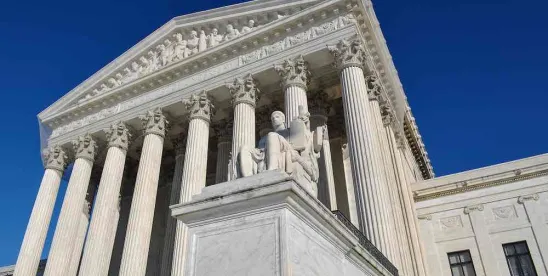Summary:
On April 12, 2024, the Supreme Court issued a unanimous decision in Macquarie Infrastructure Corp. v. Moab Partners, L. P., holding that a failure to make a disclosure required under Item 303 of SEC Regulation S-K cannot support a private claim under Rule 10b-5(b) of the Securities Exchange Act of 1934, as amended, in the absence of an otherwise-misleading statement.[1] The decision confirms that pure omissions are not actionable under Rule 10b-5(b).[2]
Background:
Rule 10b-5(b) broadly prohibits fraud and deceptive practices in connection with the purchase or sale of securities.[3] In the case of public companies, Rule 10b-5(b) prohibits the company, its officers, directors, employees, and other affiliated persons from making false statements of material fact or omitting material facts necessary to prevent statements made from being misleading in connection with the purchase or sale of securities.[4]
The SEC enacts rules and regulations that govern the type of information registrants must disclose. Item 303 of Regulation S-K, Management's Discussion and Analysis of Financial Condition and Results of Operations (MD&A), requires public companies to disclose any known trend, event or uncertainty that is reasonably likely to have material effects on a registrant’s financial conditions or operations.[5]
The case centered on Macquarie Infrastructure Corporation, a formerly traded public company that owns infrastructure-related businesses that operate large liquid storage terminals.[6] In 2018, the company failed to disclose information in its SEC filings about a change in international regulations that capped sulfur content in shipping fuel at 0.5% by 2020.[7] These regulations effectively banned fuels with high amounts of sulfur, including No. 6 fuel oil, Macquarie’s largest storage product.[8] When Macquarie missed their financial projections and announced that many of their customers were terminating their storage contracts in connection with the falling sale price of No. 6 fuel, Moab Partners, L.P., representing a class of investors, sued Macquarie in the Southern District of New York, alleging violations of Rule 10b–5(b) due to material omissions in Macquarie’s disclosures under Item 303.[9]
The District Court dismissed the case, but the Second Circuit reversed, reasoning that Moab adequately pled that Macquarie had an obligation under Item 303 to disclose a known trend or uncertainty that could impact financial performance.[10]
In a unanimous opinion authored by Justice Sotomayor, the Supreme Court vacated the Second Circuit’s decision, holding that Rule 10b-5(b) “does not proscribe pure omissions.”[11] The Court reasoned that the Rule “requires disclosure of information necessary to ensure that statements already made are clear and complete.” Thus, the Rule “covers half-truths, not pure omissions.”[12]
What Does This Mean for You?
- Focused Liability: Companies are not liable under Rule 10b–5(b) solely for failing to disclose material information if that failure does not render existing statements misleading. Private plaintiffs now face stricter criteria in establishing liability for securities fraud claims. A claim under 10b-5(b) must be premised on false or misleading statements, not pure omissions. Private plaintiffs can still pursue claims based on omissions that create misleading half-truths.
- Disclosure Obligations: While the ruling limits liability for pure omissions under Rule 10b–5(b), it underscores the importance of companies giving careful attention to their disclosure obligations, including Item 303 of Regulation S-K, which requires disclosure of known trends and uncertainties that can impact finances. Failure to disclose material information required by regulations can still lead to liability if it renders existing statements misleading.
- Importance of Affirmative Statements: The ruling highlights the importance of affirmative statements in assessing the materiality of omissions. Registrants should ensure that their disclosures are comprehensive and accurate.
- Securities Litigation Implications: The ruling may impact future securities litigation cases, as plaintiffs will need to demonstrate that omissions render existing statements misleading to establish liability under Rule 10b-5(b). While the ruling narrows the scope of Rule 10b-5(b), plaintiffs can still pursue securities fraud claims under separate provisions of Rule 10b-5(b) and under the Sarbanes-Oxley Act of 2002.[13]
What is a pure omission as compared to a half-truth? The Supreme Court provides a classic example in its opinion, stating, “The difference between a pure omission and a half-truth is the difference between a child not telling his parents he ate a whole cake and telling them he had dessert.”[14] For public companies, the circumstances are not likely to be this simple. SAM attorneys regularly counsel companies and their officers and directors on securities law compliance, disclosure responsibilities, and SEC reporting obligations.
[1] Slip op. at 4-5.
[2] Id. at 8.
[3] Id. at 1-2.
[4] Id. at 4.
[5] Id. at 2, 5.
[6] Id. at 2.
[7] Id.
[8] Id.
[9] Id.
[10] Id.
[11] Id. at 5.
[12] Id.
[13] Corso, J. (2024, April 12). Justices Limit Shareholder Suits Over Corporate Disclosures. Law360. https://www.law360.com/articles/1806902/justices-limit-shareholder-suits-over-corporate-disclosures.
[14] Slip op. at 5.



 />i
/>i

